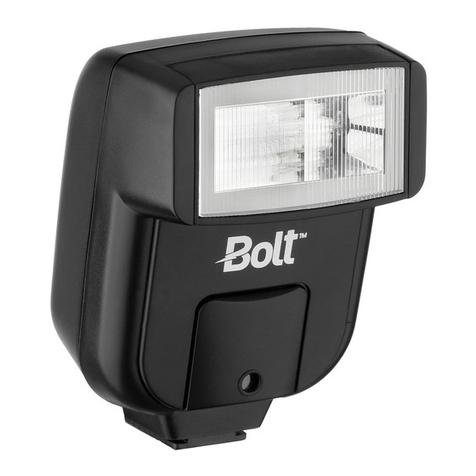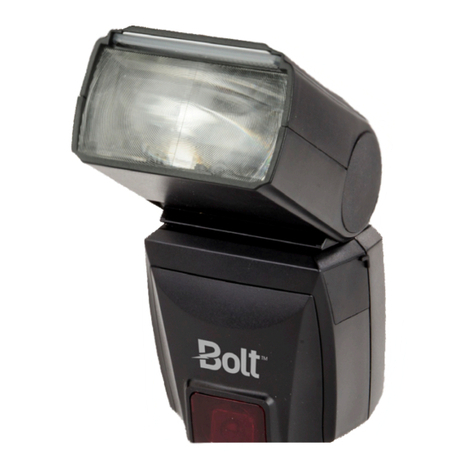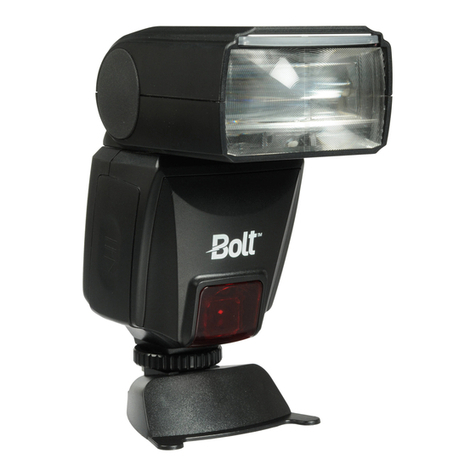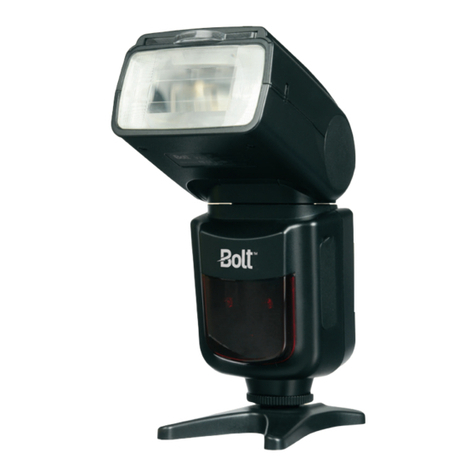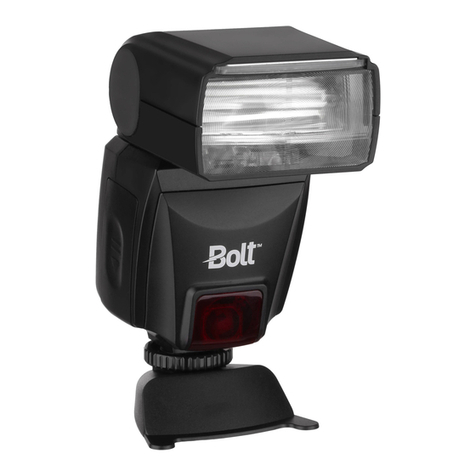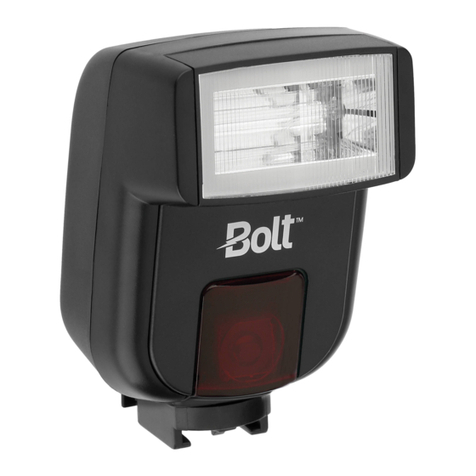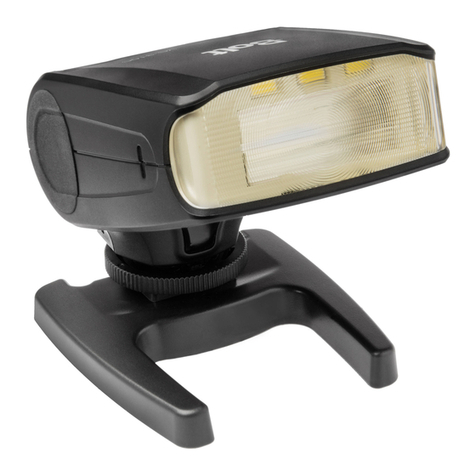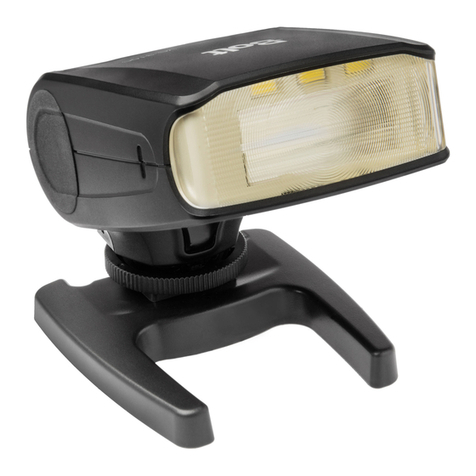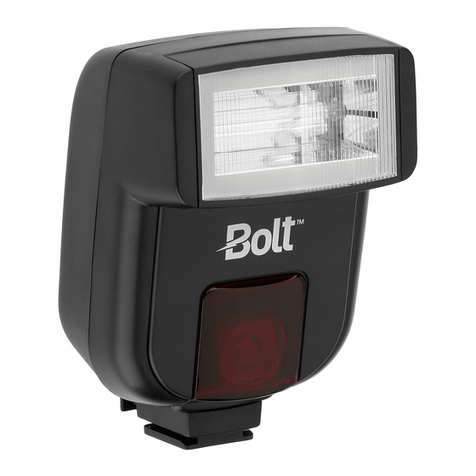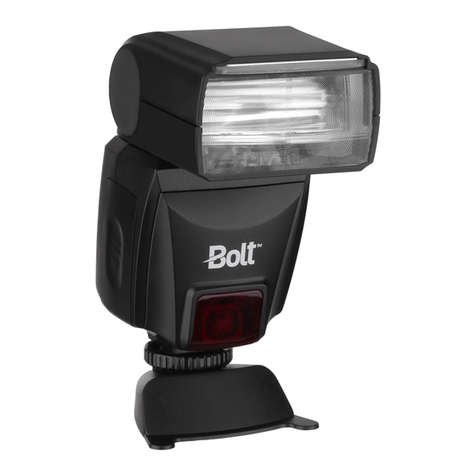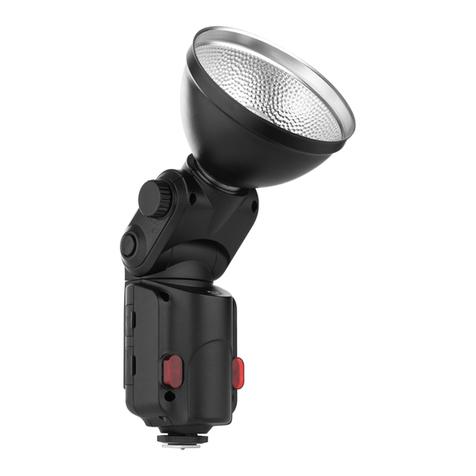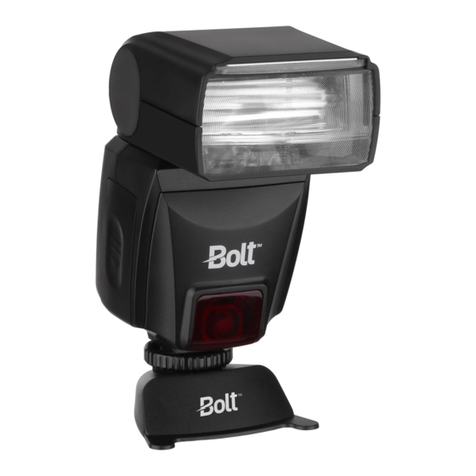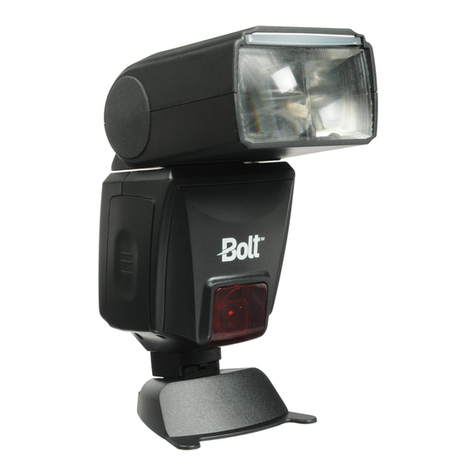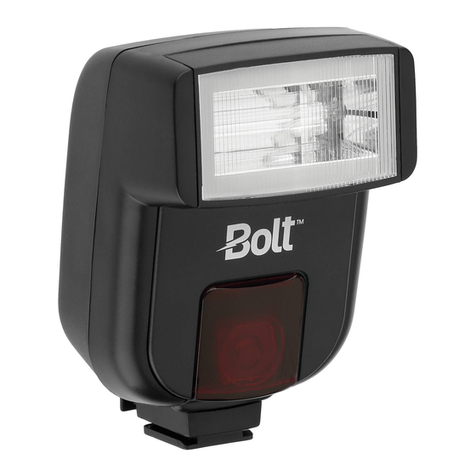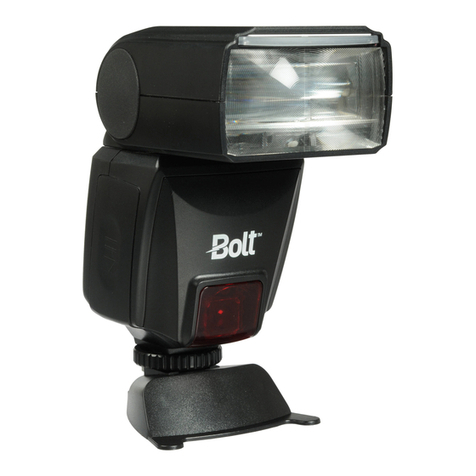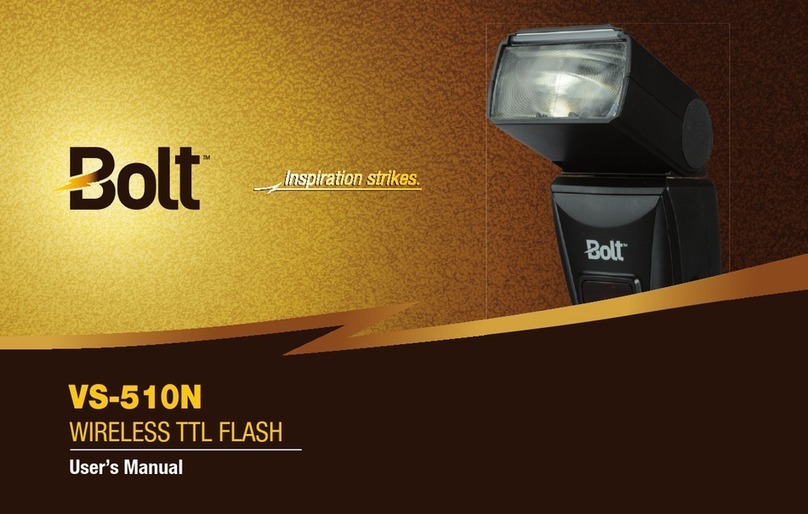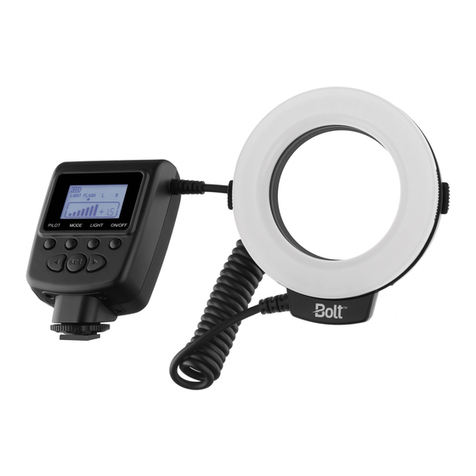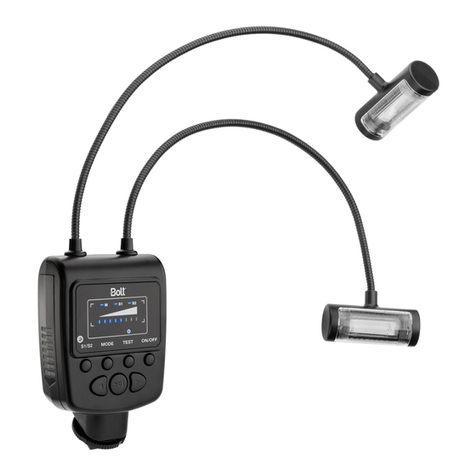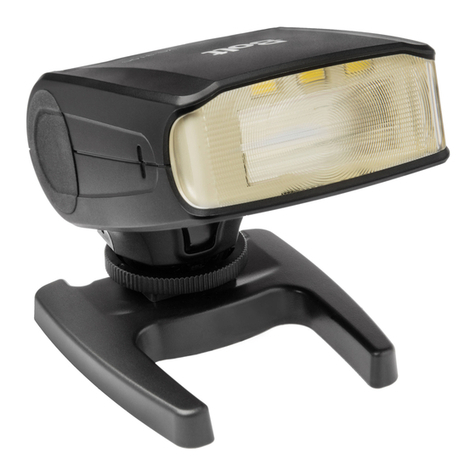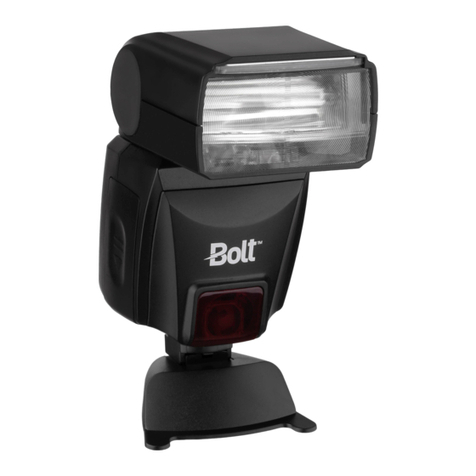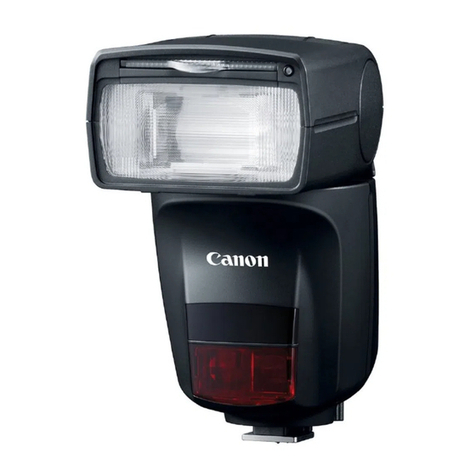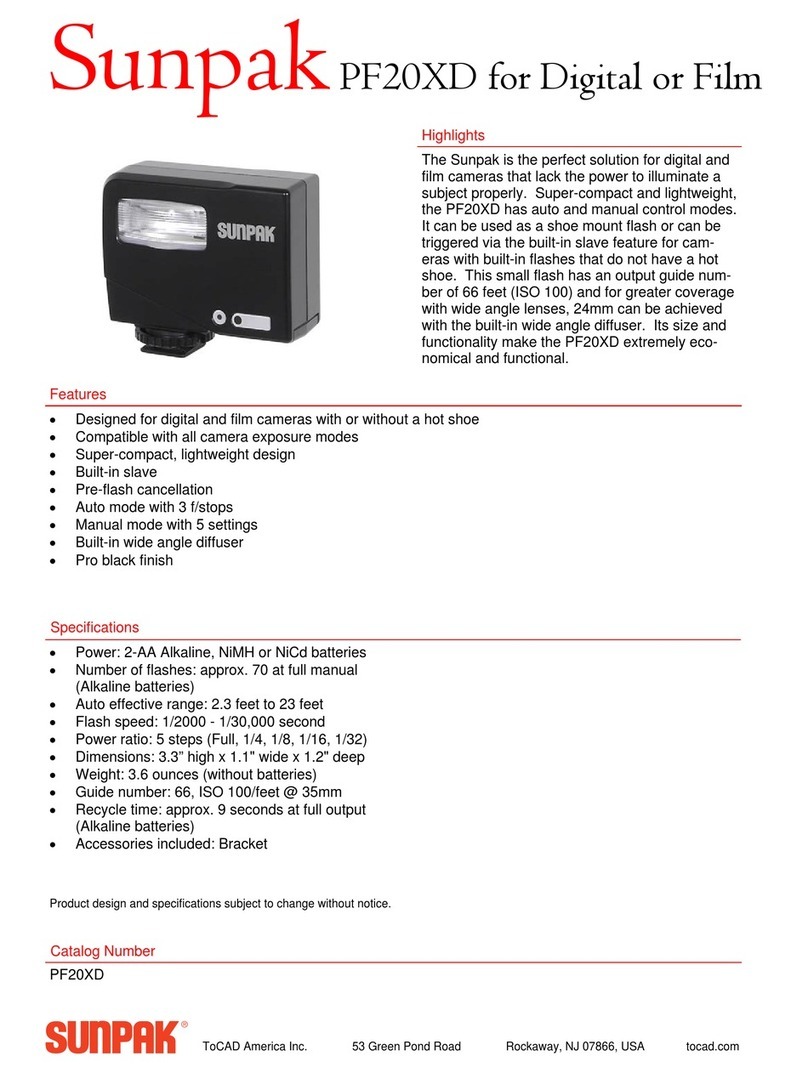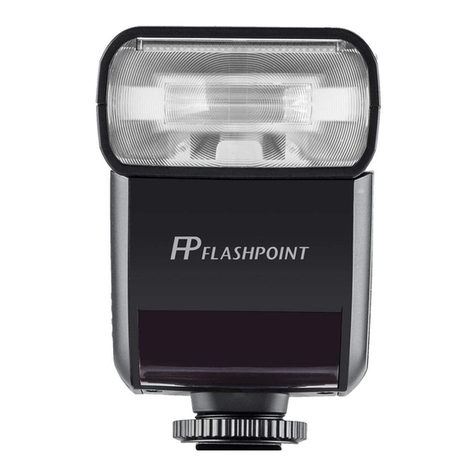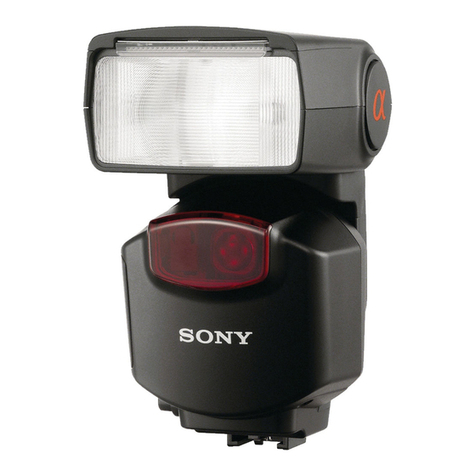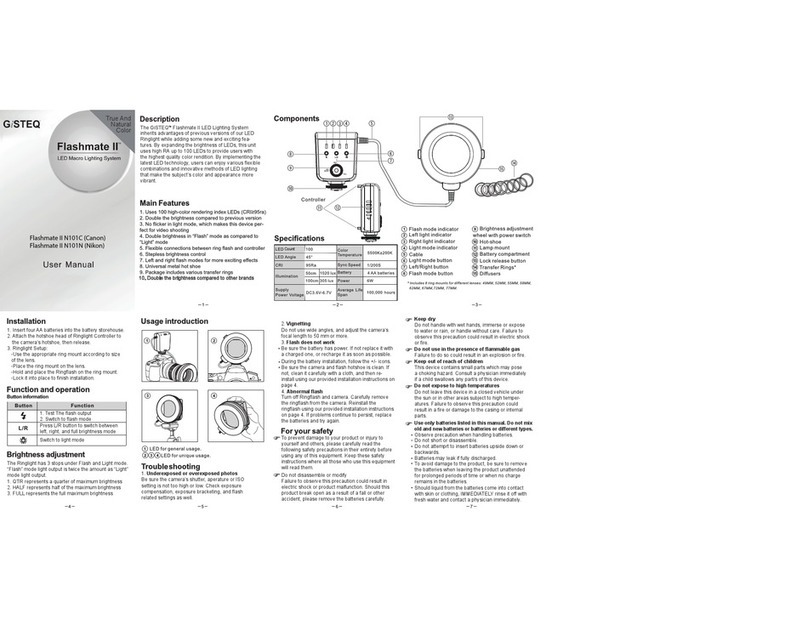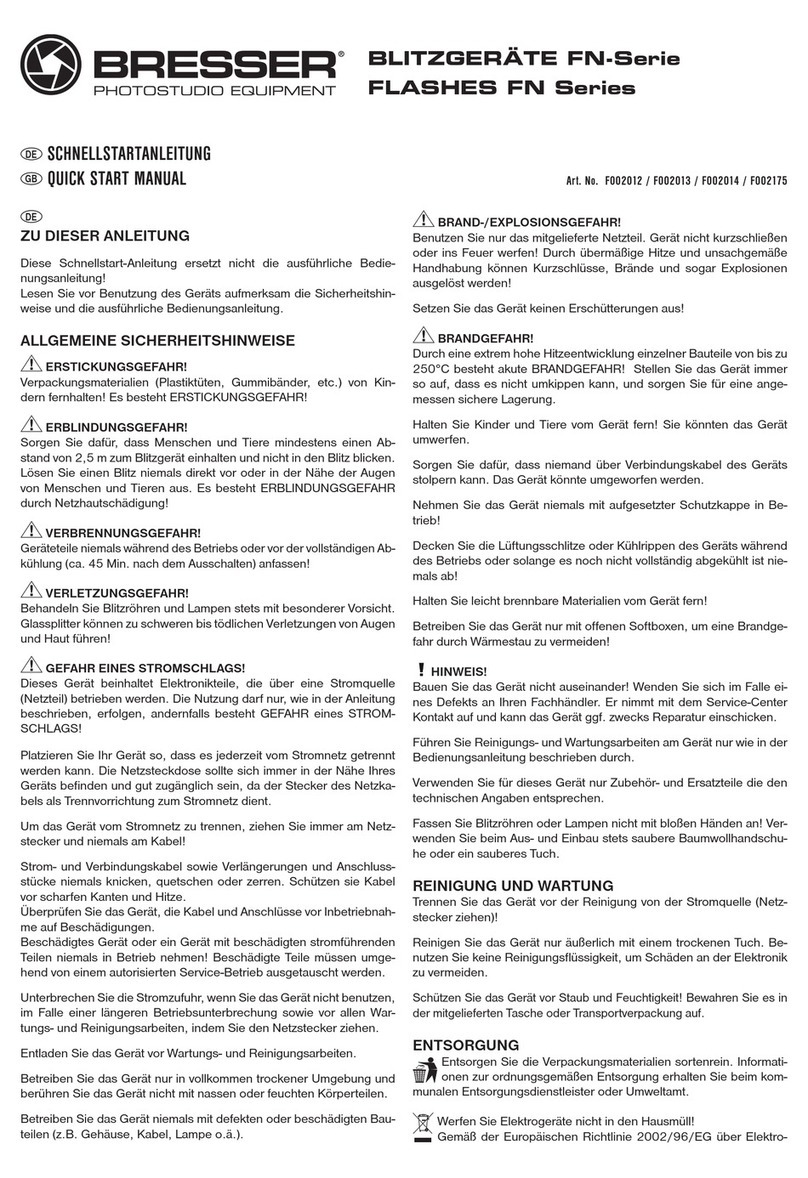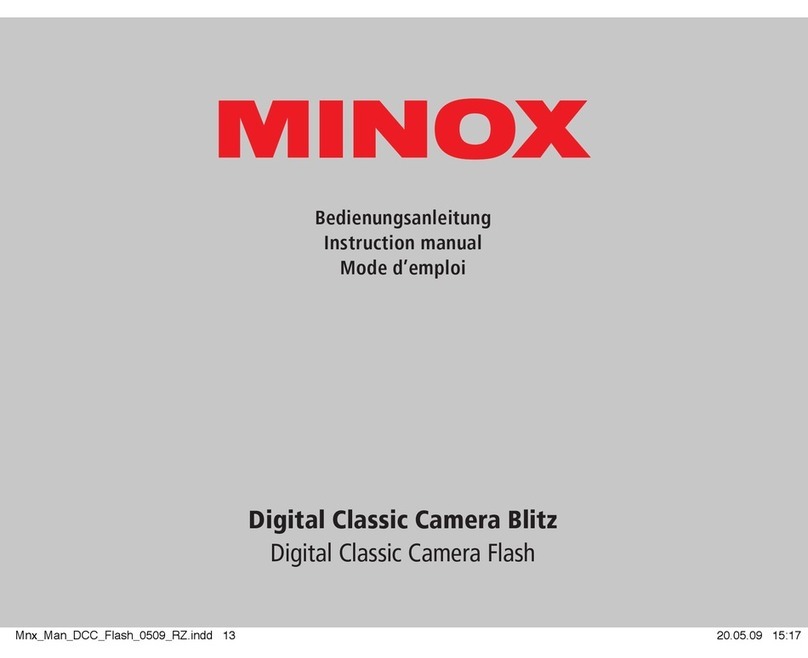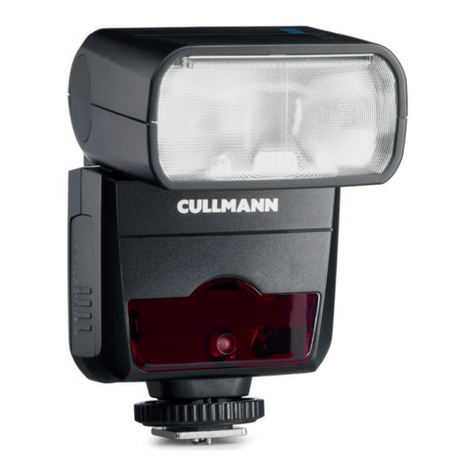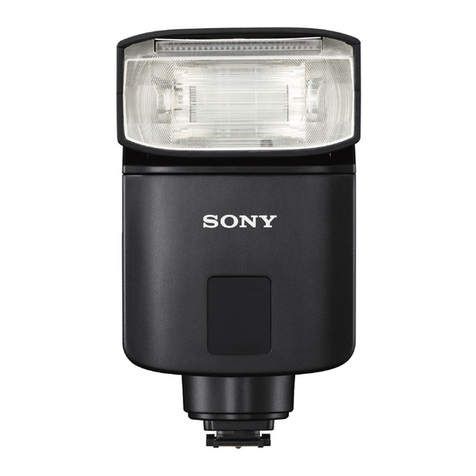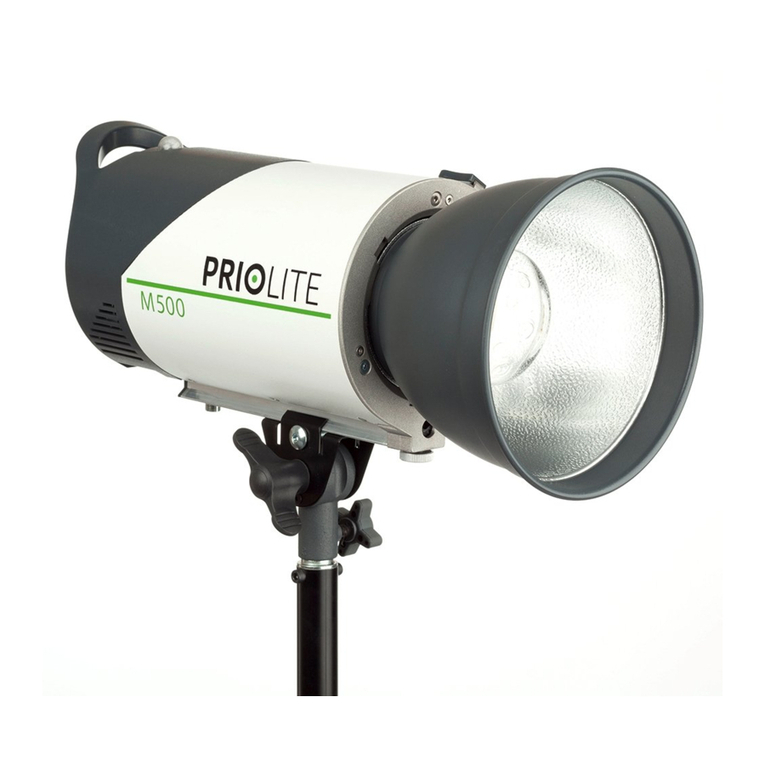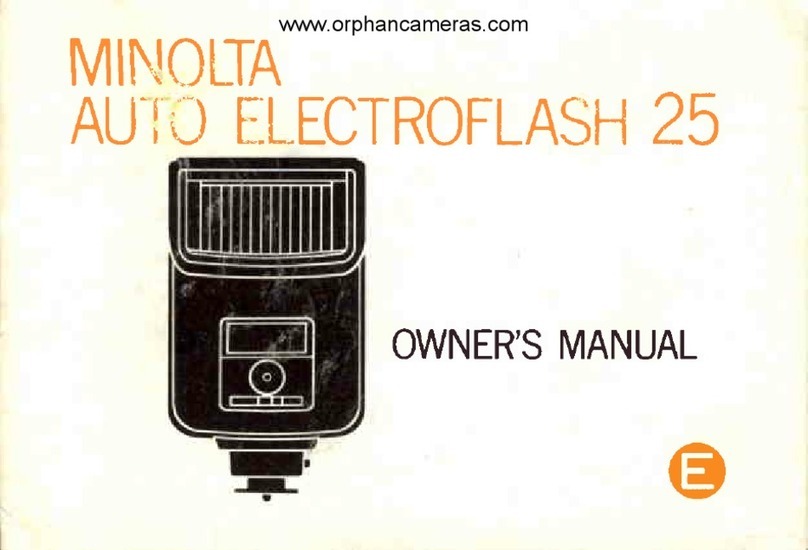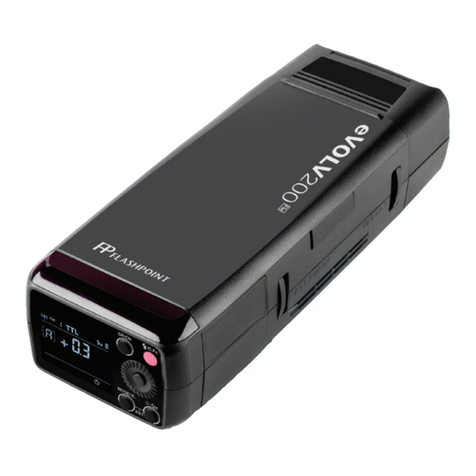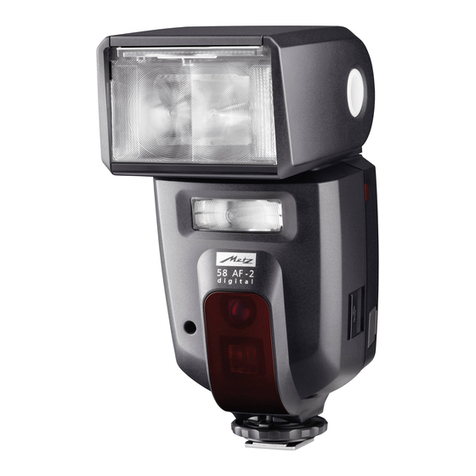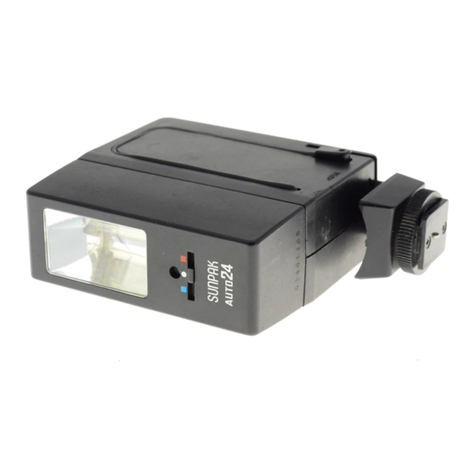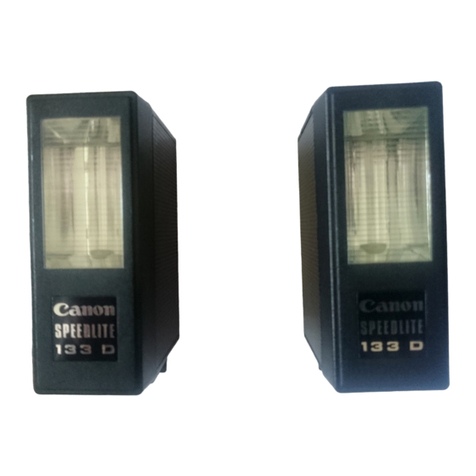Bolt VX-710C User manual

VX-710C
TTL FLASH
User’s Manual
Inspiration strikes.
Inspiration strikes.

2 |Introduction
Copyright © 2012 Gradus Group.
Bolt and other names of Bolt products are trademarks of Gradus Group. Other product and corporate names mentioned herein are trademarks of their respective holders.

Introduction |3
Introduction
Thank you for choosing the Bolt VX-710C Flash. This advanced digital ash unit puts creative control in your
hands with a broad range of automatic and manual features. It can be used as both an on-camera ash and as
a wireless slave ash. Among the benets you’ll enjoy:
• Full compatibility with Canon’s E-TTL and E-TTL II metering systems
• Flash exposure bracketing
• Automatic and manual zoom from 24mm to 180mm
• Tilt and swivel head: -7° down, 90° up, 180° right, and 90° left
• Two-inch backlit LCD
• Eight manual ash levels: full to 1/128 power, plus ne-tuning by 1/3
• Autofocus-assist for low-light photography
• Wireless optical slave
• Rear-curtain sync
• Built-in reector and diffuser panels
• Automatic power-saving function

4 |Contents
Contents
Introduction ..................................................................................................................................................2-3
Overview ......................................................................................................................................................6-9
Warnings ..................................................................................................................................................10-12
Installing Batteries ....................................................................................................................................12-13
Mounting the Flash ...................................................................................................................................14-15
Turning on the Flash and Firing a Test.......................................................................................................16-18
Extended Interface....................................................................................................................................19-20
Using the Automatic TTL Flash Mode ............................................................................................................. 21
Locking Flash Value ....................................................................................................................................... 22
Using Flash Exposure Compensation.............................................................................................................. 23
Using Flash Exposure Bracketing ..............................................................................................................24-25
Using the Manual Flash Mode ...................................................................................................................26-27

Contents |5
Controlling Flash Coverage (Zoom)............................................................................................................27-30
Using the Autofocus-Assist Light.................................................................................................................... 31
Bouncing Your Flash..................................................................................................................................31-33
Red-Eye Reduction ........................................................................................................................................ 34
Using Rear- or Second-Curtain Synchronization ........................................................................................34-35
Using Your VX-710C as a Wireless Manual Slave .......................................................................................36-38
Positioning Slave Flash Units.....................................................................................................................38-39
Troubleshooting ........................................................................................................................................40-41
Specications ................................................................................................................................................ 42
Customer Service .......................................................................................................................................... 42
FCC Notices................................................................................................................................................... 43
Limited Warranty ........................................................................................................................................... 44

6 |Overview
VX-710C
2
1
4
5
6
3
7
8
10
11
12
13
15
14
16
17
19
20
22
21
18
9

Overview |7
Overview
1. Flash head
2. Reector panel
3. Diffuser panel
4. AF assist light
5. Wireless slave sensor
6. Locking wheel
7. Mounting foot
8. Extended interface cover
9. Power source socket
10. PC sync terminal
11. Flash head position indicator (tilt)
12. Flash head position indicator (swivel)
13. LCD
14. Sub button
15. Lock / audio button
16. Pilot button
17. Mode button
18. Navigation buttons
19. Power switch
20. Flash ready light
21. Zoom position button
22. Battery compartment cover

8 |Overview
Zoom
ISO
23 24 25
30 31 32 33 35 36 3734
38
41
27
26
28
29
39
40

Overview |9
23. TTL mode
24. Manual zoom mode
25. Zoom position
26. Flash exposure bracketing
27. Flash exposure compensation
28. Manual mode
29. ISO speed
30. Lock icon
31. Sound icon
32. Low battery icon
33. Thermal warning icon
34. Manual ash output / Flash
exposure compensation value /
Flash exposure bracketing value
35. Camera communication icon
36. S1/S2 wireless ash mode icon
37. Rear-curtain sync icon
38. Camera aperture (f-stop) / Manual
ash 1/3-stop increment
39. PC sync cord
40. Soft case
41. Stand / Tripod mount

10 |Warnings
Warnings
Before using your VX-710C, please read the following safety notices carefully and thoroughly to ensure safe
use, and to help prevent damage to your ash or injury to yourself or others.
• Do not re the ash at close range directly into the eyes of people or animals. This can cause damage to
the retina and may even lead to blindness.
• To avoid overheating and damaging your ash unit, please wait for at least ten minutes after twenty-ve
continuous ashes at full power.
• Do not disassemble or attempt to repair this product yourself. There are high-voltage components inside
that can produce a hazardous electric shock.
• Keep this product and its batteries out of the reach of children.
• Use only the power sources specied in this manual.
• Always switch the ash off before changing the batteries.
• Always install AA batteries of the same type, brand, and age. Do not combine different types or brands, or
old and new batteries. This can cause the batteries to leak, overheat, or explode.
• Install the batteries in the proper orientation, according to the indicator in the battery chamber. Installing
batteries in the reverse orientation may cause them to leak, overheat, or explode.

Warnings |11
• Do not use or store the VX-710C in ammable conditions (such as environments containing ammable
gases or liquid chemicals). This can damage the ash, start a re, or cause an electric shock.
• Do not clean the VX-710C with agents containing corrosive or ammable substances such as paint thinner,
benzene, or nail polish remover.
• This product is not water resistant. Keep it away from rain, snow, humidity, and general moisture.
• Should the VX-710C sustain physical damage, do not touch any exposed interior metal parts. If touched,
they may generate an electric shock or cause a malfunction. Promptly remove the batteries and take the
product to an authorized service center for repair.
• If you detect excessive heat, smoke, or a burning smell coming from the ash, immediately stop operation
and remove the batteries to prevent the product from igniting or melting. Take the product to an authorized
service center for repair.
• Do not drop or otherwise cause a strong physical impact to the VX-710C, as this can cause a malfunction
that may cause it to explode or ignite.
• Remove all batteries from the VX-710C before long-term storage in order to prevent the product from
igniting or leaking corrosive liquids.
• Do not store or use this product at temperatures above 104°F (40°C).
• Keep the metal contacts in the battery compartment clean and free of corrosion and dirt. Do not touch
them with your ngers. Corrosive elements on the contacts can damage the VX-710C and prevent it from
functioning properly. Contacts may be cleaned with isopropyl alcohol on a cotton swab.

12 |Installing Batteries
• Dispose of used batteries properly. Never heat them or throw them into a re, as this can cause the
batteries to leak corrosive liquids, generate heat, or explode.
Installing Batteries
The VX-710C can be powered by four AA batteries of several types:
• Lithium (1.5 V)
• Nickel-metal hydride (Ni-MH) (1.2 V)
• Alkaline (1.5 V)
Note: For the fastest recycle times and longest battery life, lithium or Ni-MH batteries are recommended.
To install batteries, make sure the VX-710C is turned off and follow these steps:
1. Press on the battery compartment cover and slide it in the direction of the arrow to open it.
2. Insert batteries in the orientations indicated by the illustrations inside the compartment.

Installing Batteries |13
3. Close the battery compartment cover by pressing and sliding it into place, in the opposite direction of the
arrow on the cover.
123
1
21
2
When the battery power is low, the low battery indicator ( ) will appear on the LCD, the ash ready light will
turn red for twenty seconds or longer, and the ash will continuously beep for approximately ten seconds.
Important! Replace all four batteries at the same time. Do not mix battery types or brands, or use old and new
batteries together.

14 |Mounting the Flash
Mounting the Flash
To mount the ash on your camera, make sure the VX-710C is turned off and follow these steps:
1. Rotate the locking wheel counterclockwise to loosen it.
2. Slide the mounting foot all the way into your camera’s hot shoe.
3. Rotate the locking wheel clockwise until secure.
2 31

Mounting the Flash |15
To dismount the ash from your camera, make sure the
VX-710C is turned off and follow these steps:
1. Rotate the locking wheel counterclockwise to release the ash.
2. Slide the mounting foot out of your camera’s hot shoe.
Mounting the VX-710C on the included stand:
You can mount the VX-710C on the included stand in the same way you would mount it on your camera. This
allows you to set the ash up on a at surface, or to attach it to a tripod head, light stand, or clamp that has a
compatible 1/4”-20 screw mount.

16 |Turning on the Flash and Firing a Test
Turning on the Flash and Firing a Test
To turn the ash on, slide the power switch to the ON position.
Flash ready light: The ash ready light indicates the status of
your ash:
Color of ash ready light Status of VX-710C Operation
Green Flash ready Normal
Red Recycling Normal
Red for 20+ seconds Battery low Replace batteries
If the ash is mounted on your camera, a ash icon will also appear in the camera’s viewnder.
To re a test ash, press the PILOT button.

Turning on the Flash and Firing a Test |17
Automatic power-saving function: After three minutes of inactivity, the ash will automatically enter power-
saving mode to conserve battery life. The LCD and the ash ready light will turn off. To reactivate the VX-710C,
press the PILOT button or press your camera’s shutter-release button halfway. During long periods of inactivity,
use the power switch to turn the ash off completely.
LCD illumination: When you turn the ash on or press any button, the LCD will be illuminated for about six
seconds.
Audio monitor: The audio monitor feature causes the ash to emit one or more beeps to indicate the status of
the ash:
Audio monitor Status of VX-710C Operation
One beep Pressed button/red ash Normal
Two beeps Flash ready Normal
Long beep for 10+ seconds Entering overheating protection
mode
Turn the ash off for 10 minutes
to let it cool off
Continuous beeping for approx.
10 seconds
Low battery warning Replace batteries

18 |Turning on the Flash and Firing a Test
To turn on the audio monitor, press the LOCK/AUDIO ( ) button repeatedly until the audio icon ( ) blinks on
the LCD, then press the MODE button to conrm. Repeat this step to disable the audio monitor. Note that the
low battery warning will sound even if the audio monitor is off.
Lock mode: To prevent inadvertent operation of your ash, you can lock it by setting it to lock mode. To lock
the device, press the LOCK/AUDIO ( ) button so the lock icon ( ) blinks on the LCD, and press the MODE
button to conrm. This will lock all of the buttons except for the power switch. To unlock the device, press and
hold the LOCK/AUDIO ( ) button until the lock icon ( ) disappears.
Important!
Make sure that slave mode is turned off when mounting the VX-710C on your camera. Turn it on only when
using the ash as an off-camera wireless slave.
Overheating protection mode: If the operating temperature of the VX-710C is too high, or after 25 continuous
ashes at 1/1 (full power), the ash will enter overheating protection mode. The thermal warning icon ( ) will
appear on the LCD, the unit will emit a long beep for over ten seconds, and you will be unable to re a ash.
We suggest you turn the unit off for ten minutes to let it cool down.

Extended Interface |19
Extended Interface
You can connect your VX-710C to an external power source or PC sync via the extended interface on the side
of the ash.
External power source: An external power source, such as the Bolt Cyclone Battery Pack, can greatly
increase the battery life of your ash and reduce the recycle time in between ashes.
Note: When using an external power source, the AA batteries must still be in the ash in order to operate.
PC Sync: You can synchronize your VX-710C with a camera by running a PC cord between your camera and
the VX-710C’s PC sync terminal. This lets you position the ash away from the camera, thus giving you more
lighting options.
Note: The PC sync terminal on the VX-710C is only for synchronous signal input, and not output.

20 |Extended Interface
To access the extended interface, follow these steps:
1. Pull back the contact cover on the side of the ash.
2. Plug the cable into the corresponding socket or terminal.
A. For an external power source, plug the power cable
(Canon CZ-type, not included) into the external
power source socket.
B. For PC sync, plug the PC cord into the PC sync
terminal.
Note: When using both cables at the same time, rst insert the PC cord and then insert the power cord. Very
rarely, a thick-proled PC cord will not t at the same time as the power cable. In that case, use the supplied
PC cord.
Table of contents
Other Bolt Camera Flash manuals
